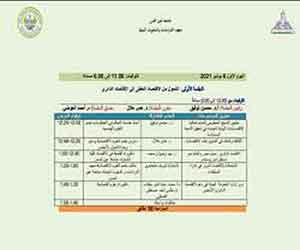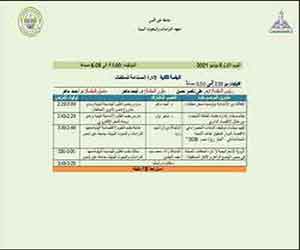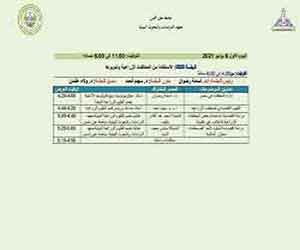Three sessions on the first day of the scientific conference “Integrated Waste Management and Circular Economy”
Under the auspices of Prof. Dr. Khaled Abdel Ghaffar, Minister of Higher Education and Scientific Research, Prof. Dr. Mahmoud El-Metini, President of Ain Shams University, Prof. Dr. Ayman Saleh, Vice President for Graduate Studies and Research, Prof. Dr. Hisham Tamraz, Vice President for Community Service and Environmental Development, Prof. Dr. Noha Samir Donia, Dean of the faculty of Environmental Studies and Research, Prof. Dr. Reham Refaat Mohamed Abdel Aal, Vice Dean of the Institute for Graduate Studies and Research, Prof. Dr. Hala Ibrahim Awadallah, Deputy faculty for Community Service and Environmental Development, Prof. Dr. Taha Abdel-Azim Al-Sabbagh, Conference Rapporteur, and Dr. Huda Helal, conference coordinator, and in cooperation with the Ministry of Environment and the Waste Management Authority, the first sessions of the scientific conference “Integrated Waste Management and the Circular Economy” were launched this morning, which will be held virtually online from 6-8 June on the occasion of World Environment Day.
The inaugural lecture was delivered by Prof. Dr. Alaa Abada Sarhan, Professor of Environmental Economics and an expert at the World Bank, talks about the latest developments in the world of circular economics.
A workshop on e-waste was also held on the sidelines of the events, which was moderated by Prof. Dr. Abdel Masih Semaan, professor at the Institute and former Vice Dean for Graduate Studies and Research Affairs.
The conference is held over three days, the first day contains three sessions, the second day contains four sessions, and the third day contains four sessions.
The first session comes under the title "Transformation from a Linear Economy to a Circular Economy", and the session is chaired by Prof. Dr. Mohsen Tawfek, which deals with several topics:
Applying the systemic approach to determine the effectiveness of the new environmental economics in achieving sustainable development. Dr. Mohsen Tawfik, Professor of Systems Control Engineering, Department of Engineering Sciences.
Cost and return in economic projects and lectured by d. Huda Helal, teacher in the Department of Economics and Director of the Green Transformation Unit.
The circular economy is the path of Egypt and the world towards a secure and sustainable future, lectured by Dr. Maha Radwan, Ph.D. in Economics, Faculty of Business, Ain Shams University.
Using the circular economy in waste management, and it is lectured by researcher Sherif Tantawi, student in the Department of Economics, faculty of Environmental Studies and Research, Ain Shams University
The role of environmental knowledge management in supporting the green circular economy, in which Dr. Muhammad Abdo Tamer Khattab and d. Helmy Ahmed Mustafa Al-Qamati, who received a Ph.D. in economic sciences.
The second session is moderated by Prof. Dr. Ali Nasser Hassan, entitled "Sustainable Waste Management", addresses the following topics:
The relationship between sustainability and the zero-waste hypothesis, which Dr. Ahmed Maher is a teacher in the Department of Environmental Engineering and Director of the Shams Waste Recycling Project.
A sustainable renewable energy waste management system by Dr. Hager Nawar, teacher in the Department of Basic Environmental Sciences and director of the e-learning unit.
Evaluating the policies of employing green bonds in the Circular economy to achieve the sustainable development goals within the framework of the "Egypt Vision 2030" by researcher Noran El-Sayed Zayed, a student at the Environmental Economics Department, Institute of Environmental Studies and Research, Ain Shams University
The strategic vision for solid waste management in Egypt, the current situation and future prospects, with a lecture by researcher Randa Mohamed Sayed Ahmed El-Gendy, a student at the Department of Environmental Engineering Sciences, faculty of Environmental Studies and Research, Ain Shams University.
Session Three: Utilizing and Recycling Agricultural Wastes and Managed by Prof. Dr. Osama Radwan deals with the following topics:
Waste management in Egypt and a lecture by Prof. Dr. Osama Radwan, Professor of Microbiology and Food Biotechnology, Department of Agricultural and Environmental Sciences.
Economic evaluation of agricultural residues and lectured by Prof. Dr. Seham Ahmed, Assistant Professor and Head of the Department of Agricultural Sciences.
An economic study for the use of some agricultural residues as non-traditional fodder and lectured by researcher Ahmed Abdel Kader, student at the Department of Environmental Agricultural Sciences, faculty of Environmental Studies and Research, Ain Shams University.
An economic study of leather as one of the most important remnants of livestock massacres, dealt with by researcher Sundus Mohamed El-Sayed, student in the Department of Agricultural and Environmental Sciences, faculty of Environmental Studies and Research, Ain Shams University.
 |
 |
 |
||
On its first day, the conference came out with several recommendations, including:
Establishing a waste recycling unit in every industrial establishment within the country and making it one of the licensing requirements for these facilities.
Recommending that the Institute of Environmental Studies and Research be the national entity entrusted with carrying out environmental scientific research at the national level for national projects.
Recommending the adoption of the circular economy and its mechanisms within the official objectives of the countries' economy.
Increasing awareness of the importance of circular economy in undergraduate curricula at the bachelor’s or bachelor’s level.
Recommending that measuring the carbon footprint is a vital and necessary request so that clear information and data on pollution can be obtained in the place under study.
Recommending the expansion of economic feasibility studies to be a basis for studying costs and returns from economic and social variables to achieve returns to assess the sustainable effects.
Determining some steps and treatments for waste through a clear plan that helps reduce carbon emissions.
Providing full support for the establishment of an interdisciplinary program on sustainable energy between the two departments of basic sciences and environmental engineering sciences in the Faculty.
Follow the recommendations of the European Union in managing waste of solar energy cells in particular and electronic waste in general.
Expedite the issuance of laws and legislation for the management of e-waste.
Providing environmental support for modern solar energy projects, for example, the North Aswan Solar Project
Expand the use of green bonds for the financial support required for environmental related projects.
Recommending the use of available environmental tools such as risk assessment and environmental examination in support of economic principles
for the Circular economy
- Recommending that solar cells be considered an alternative and clean energy that serves the Circular economy in the case of implementing the recommendations of environmental experts in the treatment of electronic waste generated
Expanding research activities to help reduce the carbon footprint in various agricultural and industrial activities.
Expand support for new innovations in the direction of clean technology.
Expanding the production of organic fertilizer from domestic and industrial organic waste through the modern research trend in cleaner production technology.
- Combine efforts and eliminate random and open dumps and raise awareness among those who deal with garbage according to its quantity and quality.
Encouraging investment in the production of alternative fuels and the establishment of factories that contribute to the disposal and utilization of about 20% of municipal waste in Cairo.
- Activating the role of government cleaning companies and raising awareness among citizens of the need for preliminary screening.
- Raising awareness and guiding farmers about the importance of plant waste (by-products of agricultural crops) and the added value to it when recycled, considering it as an additional income from wasted products.
Encouraging the private sector to invest in the collection, utilization and recycling of plant waste from smallholder farmers.
Importing live animals (livestock) and not meat so that we can benefit from the resulting waste, such as skins, bones and others, and encourage investment in the field of leather tanning and manufacturing in Egypt and benefit from the added value instead of exporting leather as a raw material.
The number of attendees in the workshop reached 250 participants, and the number of participants in the conference reached 370 participants, with a total attendance of 620 participants online.


.svg)




